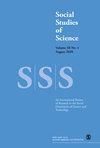计算普遍性,或者,关注尺度上的关系。
IF 2.7
2区 社会学
Q1 HISTORY & PHILOSOPHY OF SCIENCE
引用次数: 0
摘要
社会科学和人文科学越来越多地采用计算术语作为调查的组织类别。我们认为,通过围绕本地计算对象(如数据、算法或人工智能)和划分的世俗领域(如金融、健康和治理)组织研究,学者们有可能模糊计算的普遍实践和抱负。这些实践试图在前所未有的规模上建立新的关系,连接不同的领域,跨边界循环资源,并将计算干预定位为普遍适用的。利用考察普遍性主张的固定性的知识传统,我们对计算范畴的容易采用提出了问题,并认为它们作为认知陷阱,使计算普遍性的扩展范围自然化。我们不接受对话者的刻板分类,而是建议关注部分的、努力的、经常有争议的翻译和通约工作,使计算参与者能够将自己定位为所有领域的强制性通道点。这种方法不仅揭示了计算关系在规模上的显著成就,而且还揭示了它们的排除、背叛和偏袒。我们的干预旨在激发研究计算参与者如何解析技术对象和社会世界的观点,以推进普遍化的雄心,同时模糊维持这些划分和联系所需的巨大劳动。本文章由计算机程序翻译,如有差异,请以英文原文为准。
Computational universalism, or, Attending to relationalities at scale.
The social sciences and humanities have increasingly adopted computational terminology as the organizing categories for inquiry. We argue that by organizing research around vernacular computational objects (e.g. data, algorithms, or AI) and divided worldly domains (e.g. finance, health, and governance), scholars risk obscuring the universalizing practices and ambitions of computation. These practices seek to establish new relationalities at unprecedented scales, connecting disparate domains, circulating resources across boundaries, and positioning computational interventions as universally applicable. Drawing on intellectual traditions that inspect the fixity of universalizing claims, we problematize the easy adoption of computational categories and argue that they serve as epistemic traps that naturalize the expanding reach of computational universalism. Instead of accepting the hardened categories of our interlocutors, we propose attending to the partial, effortful, and often contested work of translation and commensuration that enables computational actors to position themselves as obligatory passage points across all domains. This approach reveals not only the remarkable achievements of computational relationalities at scale but also their exclusions, betrayals, and partialities. Our intervention aims to spur perspectives that examine how computational actors parse both technical objects and social worlds to advance universalizing ambitions while simultaneously obscuring the enormous labor required to maintain these divisions and connections.
求助全文
通过发布文献求助,成功后即可免费获取论文全文。
去求助
来源期刊

Social Studies of Science
管理科学-科学史与科学哲学
CiteScore
5.70
自引率
6.70%
发文量
45
审稿时长
>12 weeks
期刊介绍:
Social Studies of Science is an international peer reviewed journal that encourages submissions of original research on science, technology and medicine. The journal is multidisciplinary, publishing work from a range of fields including: political science, sociology, economics, history, philosophy, psychology social anthropology, legal and educational disciplines. This journal is a member of the Committee on Publication Ethics (COPE)
 求助内容:
求助内容: 应助结果提醒方式:
应助结果提醒方式:


